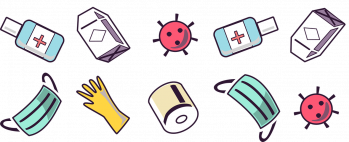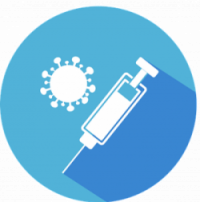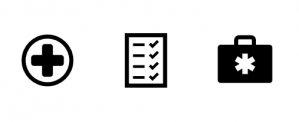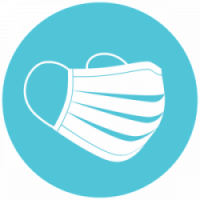As we are currently facing increasing cases of community transmission, we will try to provide you with the latest information about how you can keep yourself and your family safe, and find out what support is available.
Updated July 2022
Ways to reduce risk
- Physical distancing – try to avoid crowds and keep your distance where possible from people who are not part of your household.
- Wear a face mask - wherever possible around others (people with MND can be exempt but if you’re able to wear a mask it is recommended). See below for further details about types of masks available.
- Good hygiene – this includes washing your hands and covering any coughs and sneezes.
- Stay home - If you are self-isolating or just staying at home, you may want to organise home deliveries of food and medications.
- Symptoms - If you experience any coronavirus symptoms you should not go out, you must self-isolate and get tested for the virus if you’re able to. If you need urgent medical attention, please ring 000
- Carers and health and community care providers who work with people with MND should also take precautions to reduce their risk of contracting or spreading the virus.
- Talk with your MND Advisor, NDIS Support Coordinator or home care package providers to communicate your needs and expectations about precautions to keep you and your family safe when providing services at home.

Managing COVID-19 at home
As COVID-19 becomes more present in the community, it is increasingly important to prepare to manage safely at home if you or a family member contracts COVID-19. This guide developed by Carers NSW includes a series of key resources to assist people in NSW to plan ahead and prepare for managing COVID-19 at home.
View the guide here: Managing-COVID-19-at-home
Planning for emergencies
Emergencies can happen anytime. Planning for emergencies will help you to manage if someone in your family has an illness, accident or another emergency occurs.
- Or the Carer Gateway website: Emergency Care Plan
- Or Easy English care plan: COVID-19 Companion - health.gov.au
Self-isolating
This section provides resources from NSW Health to help you determine if you may need to get tested for COVID-19 and which test to access. Page - 12
If you are required to self-isolate, you must follow the guidelines provided by NSW Health. If you choose to self-isolate to reduce your risk of catching COVID-19, the resources may still be helpful. Page - 17
Managing practical challenges when self-isolating
If you are struggling to access essential food, medication and other goods, the following resources may be helpful:
- Information on accessing groceries from IDEAS
- Information on accessing medications from IDEAS
If COVID-19 symptoms or self-isolation are preventing you from carrying out your usual care tasks, you may need to organise alternative support arrangements for the person you care for. Alternative care arrangements during COVID-19 contains some suggestions for how to do this – Page 26
Please note that all care services are currently under immense pressure due to increased demand for support and many workers having to self-isolate.
Covid ready checklists
From The Growing Space
At home with covid list:
If you are covid positive, then these items may be helpful to monitor your symptoms at home.
- Pain medications, electrolytes to manage dehydration, diarrhoea and sore throat medications
- N95 masks, gloves, PPE, Sanitiser (wipes, gel and spray) and a designated bin
- Print this resource on managing Covid at home (from the RACGP) or access online. This guide includes a symptom diary and managing your symptoms list.
- A freezer full of food, pet food, continence/PEG supplies etc
- Air purifier (if you’re able to afford one) or keeping windows open for ventilation
- Rapid Antigen Tests
- Thermometer
- Child and pet care plans and contacts and emergency phone lists for people who might be able to help you out
- Emergency contacts for your disability support providers
- Fingertip Pulse Oximeter (make sure you research or get support on how to use these appropriately – poor readings are common, so make sure you know how to use them – How to use a pulse oximeter l NHS - YouTube this video is from the UK, so note that our emergency phone number is 000, not 999!)
Admitted to hospital list:
If your symptoms become difficult to manage at home or your breathing is affected, a hospital admission may be necessary.
- Hospital admission plan – including a page of key info about you
- Hospital go-kit – key medication list and medications, essential equipment, comfort stuff, key support plans (eating/continence etc)
- Carer Gateway: Emergency Care Plan
- Easy English care plan: COVID-19 Companion - health.gov.au
- The QLD government has a COVID Care plan for carers and children: COVID-Care-Plan-for-Parents-Carers-and-Children

Vaccinations
The Australian Department of Health encourages everyone to be vaccinated as this is the best way to protect against Covid-19. Having a COVID-19 vaccine will lower your chance of getting sick or having a serious illness. People living with MND are listed as a priority medical condition.
There is no known conflict between the vaccines and MND. The Association of British Neurologists recommends people with neurological conditions accept whichever vaccination they are offered without delay, unless they have a specific contraindication such as severe allergy.
Your GP or neurologist can answer any specific questions you may have about your personal circumstances and the vaccines. To find out where you can receive your vaccine and to book an appointment, please see Service Finder (healthdirect.gov.au)
Vaccine Boosters
Anyone aged 18 years and over who received their second dose of a COVID-19 vaccine over 3 months ago is now eligible for a booster vaccination. Currently the Therapeutic Goods Administration (TGA) has approved the Pfizer and Moderna vaccine for the booster dose, regardless of which vaccine you received for your primary doses.
See the FAQs page for further information and for booking appointments: Booster vaccination - frequently asked questions and Booster vaccination | NSW Government
Additional winter booster dose
From July 2022, you are eligible for a winter COVID-19 vaccine (second booster / fourth dose) if you are:
- Aged 30 years or over
- Aboriginal and Torres Strait Islander people aged 30 years and over
- A resident of an aged care or disability care facility
- Aged 16 years and over and severely immunocompromised.
- aged 16 years and over years and have complex, chronic or severe conditions
The recommendations for an additional booster dose focus on protecting the most vulnerable groups against severe illness. You can receive your winter COVID-19 vaccination 4 months after your first booster dose, or 4 months after a confirmed COVID-19 infection if you've had COVID-19 since your first booster dose. Find out more here: Booster vaccination | NSW Government
The COVID-19 and flu vaccines can be given together at the same time. Most people who are eligible for an additional winter COVID-19 booster will also be eligible for a free flu vaccine.
Types of Vaccine
Pfizer (Comirnaty), AstraZeneca (Vaxzevria) and Spikevax (Moderna) are the vaccines currently available in Australia. These vaccines have been rigorously assessed by the Therapeutic Goods Administration to make sure they are safe and effective. Millions of people around the world have safely received these vaccines. This includes very old adults, people living in aged care facilities, and people with chronic medical conditions. COVID-19 vaccination – Easy Read resources
The current recommendations in Australia are:
- the AstraZeneca vaccine for people aged 18 years and over. You will need two doses, the second dose should be given between 4 to 12 weeks after the first dose.
- the Pfizer vaccine for people aged 5 years and over. People aged 12 years and older need 2 doses of the Pfizer vaccine, given between 3 and 6 weeks apart. Children aged 5 to 11 years need 2 doses of Pfizer for children (one third the adult dose), given 8 weeks apart unless advised by a medical professional.
- the Moderna vaccine for people aged 12 years and over. You will need 2 doses of the Moderna vaccine, given at least 4 weeks apart.
Vaccine concerns
Most side effects are mild and go away in a couple of days. In Australia the Therapeutic Goods Administration (TGA) monitors vaccine safety and side effects. COVID-19 vaccine safety and side effects | Australian Government Department of Health
For details on possible side effects for each vaccine, see:
Face masks
Evidence shows that wearing a face mask helps reduce the risk of spreading the coronavirus to others and from becoming sick ourselves. When deciding how effective a face mask is in protecting you, the most important things are:
- The level of filtration
- How well it fits and
- How comfortable it is to wear
Some scientists are now recommending that people use these higher level of protection masks rather than the cloth masks, especially when you are in higher risk situations or at higher risk of severe disease. There are now a wide range of high-filtration masks on the market that are widely available and relatively affordable.
These higher protection masks are called P2 (or N95) masks and have a higher level of filtration than cloth or surgical masks. They are available as single use, or reusable with changeable filters, but ensure you buy them from reputable companies or brands. Wearing any type of mask is still better than no mask, but to find out more about the different mask types please see below:
Where to buy high filtration (P2 or N95) masks in Australia:
CBS News in the US aired this interview in December with Aaron Collins, a mechanical engineer with an interest in aerosol science. Aaron tests and reviews different mask types available in the US for their effectiveness in preventing aerosols. Watch the CBS interview here: Some experts recommend face mask upgrades - CBS News
NSW Health provides an explanation of P2 (N95 equivalent) masks: This information was written for bushfire smoke but the filtration and effectiveness of the masks is essentially the same - P2 mask - Fact sheets - NSW Gov.
Rapid antigen tests (RATs)
More than six million Australians can now access rapid antigen tests for free. People who hold any of the following concession cards can access free rapid tests from pharmacies:
- Pensioner concession card
- Commonwealth senior’s healthcare card
- DVA gold, white or orange card
- Health care card
- Low-income card
- (NDIS Participants can use core funding to purchase Your health and safety page)
This scheme will finish at the end of July, following this state governments may introduce their own programs, visit your state government health website to find out more: NSW, ACT, NT.
NDIS participants
Participants can use their core funding to purchase RATs and PPE where it is required to access their reasonable and necessary supports. For participants - coronavirus (COVID-19) | NDIS
If you need specific information regarding safety concerns relating to the delivery of supports, please talk to someone you trust, or seek advice from the NDIS Quality and Safeguards Commission.
Further information
National coronavirus and COVID-19 vaccine helpline
Call if you need information about COVID-19, COVID-19 vaccines or help with the COVIDSafe app. The helpline is unable to book appointments on your behalf.
Ph: 1800 020 080
Web: COVID-19 vaccine enquiries
COVID-19 financial support
The NSW Government provides financial assistance and support for people impacted by COVID-19 who are experiencing financial difficulty. You can contact Service NSW on 13 77 88. COVID-19 financial support | NSW Government
Information for people with disability
People with disability and disability workers are eligible to receive the COVID-19 vaccine. Some people with disability are at greater risk of becoming very sick if they catch COVID-19, so getting vaccinated is very important. See the Department of Health website here: Information for people with disability about COVID-19 vaccines
Information for Aboriginal and Torres Strait Islander peoples
All Aboriginal and Torres Strait Islander people aged 16 and over can access a COVID-19 vaccine. Check with your local GP or healthcare worker to make an appointment. For more information, see the Department of Health website here: Information for Aboriginal and Torres Strait Islander peoples about COVID-19 vaccines
Explainer videos
COVID-19 webinar for people with disability
Date: January 2022 Duration: 01:00
This webinar is for people with disabilities. The panel will provide key updates and answer the questions of participants. Link here
Department of Health and Aged Care Videos on COVID-19
- Flu and COVID-19 Vaccination
- Flu vaccination, what is in it and how safe it is
- COVID-19 symptoms, wearing a mask, and seeking treatments
- COVID variants & symptoms, body recovery from COVID & Omicron

Support organisations
MND Australia
State MND Associations and MND Australia are continuing to provide support services to people living with MND and their families, including equipment delivery. To limit the risk of COVID-19, some state MND Associations have moved to providing some services online via video conferencing or via telephone and email. Some states and services will be available face-to-face in a COVID safe way and in accordance with the current COVID-19 regulations in your area.
To see the latest national updates, visit the MND Australia COVID-19 webpage (which also has information detailing what you should do if you have respiratory muscle weakness, use non-invasive ventilation/cough assist or notice problems with your breathing): MND Australia - COVID-19 and MND
If you have specific questions regarding your support needs, please contact your health care provider, MND Advisor, NDIS Support Coordinator or our MND NSW Information Line.
The Disability Gateway
If you are worried or concerned about COVID-19, you can get support on this website or call the Disability Gateway. The Disability Gateway is a free service available Monday to Friday 8am to 8pm (AEST).
Ph: 1800 643 787
Web: COVID-19 support
Beyond Blue - Wellbeing Support Service
Beyond Blue are providing information, advice and strategies to help you manage your wellbeing and mental health during the COVID-19 pandemic.
Ph: 1800 512 348
Web: Beyond Blue Coronavirus Mental Wellbeing Support Service
The Older Persons Advocacy Network
The Older Persons COVID-19 Support Line provides information and support for older Australians, their families and carers. You can call for extra support or if you have questions about the COVID-19 restrictions.
Ph: 1800 171 866
Web: Home - Older Persons Advocacy Network (opan.org.au)
Translating and Interpreting Service (TIS National)
TIS National is for people who do not speak English and for agencies and businesses that need to communicate with their non-English speaking clients.
Ph: 131 450
Web: Translating and Interpreting Service (TIS National)
COVID-19 vaccine information in community languages
Information about COVID-19 vaccines has been translated into multiple languages by the Department of Health. Find information in your language here: COVID-19 vaccine information in your language


